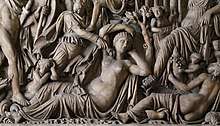List of Roman women
The list below includes Roman women who were notable for their family connections, or their sons or husbands, or their own actions. In the earlier periods, women came to the attention of (later) historians either as poisoners of their husbands (a very few cases), or as wives, daughters, and mothers of great men such as Scipio Africanus. In later periods, women exercised or tried to exercise political power either through their husbands (as did Fulvia and Livia Drusilla) or political intrigues (as did Clodia and Servilia), or directly (as did Agrippina the younger and later Roman empresses).
Roman Kingdom (753 BC–509 BC)
| Name | Image | Dates | Details |
|---|---|---|---|
| Rhea Silvia |  |
c. 700s BC | According to the founding myth of Rome, Rhea Silver was a Vestal Virgin who got pregnant by Mars and gave birth to the twins Romulus and Remus, who went on to found the city, with Romulus becoming its first king. |
| Hersilia |  |
c. 700s BC | Hersilia was the wife of Romulus and following the abduction of the Sabine women, helped end the conflict between the Romans and Sabines. |
| Tarpeia |  |
c. 700s BC | Tarpeia was the daughter of the Roman commander Spurius Tarpeius and a Vestal Virgin who betrayed Rome to the Sabines at the time of their women's abduction for what she thought would be a reward of jewellery. |
| Tatia | c. 700s–600s BC | Tatia was the daughter of Sabine king Titus Tatius and first wife of Numa Pompilius, who would become Rome's second king. | |
| Lucretia (Queen of Rome) | c. 700s–600s BC | Lucretia was the second wife of Roman King Titus Tatius. | |
| Tanaquil |  |
died c. 575 BC | Tanaquil came from a powerful Etruscan family and was Queen of Rome through her marriage to Lucius Tarquinius Priscus, Rome's fifth King. |
| Tarquinia | c. 600s–500s BC | Tarquinia was the daughter of Rome's fifth King, Lucius Tarquinius Priscus, and his wife Tanaquil. | |
| Tullia Major | died c. 535 BC | Tullia Major was the first daughter of Rome's sixt King, Servius Tullius, elder sister of Tullia Major. She was married to Lucius Tarquinius Superbus, while her younger sister married Arruns Tarquinius. She was assassinated by her husband and younger sister, so that they could marry and become monarchs. | |
| Tullia Minor |  |
died after 509 BC | Tullia Major was the second daughter of Rome's sixt King, Servius Tullius, and the young sister of Tullia Major. She was originally married to Arruns Tarquinius, while her sister married Lucius Tarquinius Superbus. Dominating her husband, she conspired with her brother-in-law to kill her husband and sister. After their assassination and that of her father, they got married and she became the last Queen of Rome. Following Lucretia's suicide and the overthrow of the monarchy, she and her family was exiled. |
| Lucretia |  |
died c. 510 BC | Lucretia was a noblewoman whose rape and eventual suicide led to the overthrow of the Roman monarchy. |
Distinguished women of the Roman Republic (509 - 27 BC)
- Valeria, the name of the women of the Valeria gens
- Valeria, first priestess of Fortuna Muliebris in 488 BC[1]
- Aemilia Tertia (с. 230 - 163 or 162 BC), wife of Scipio Africanus Major and mother of Cornelia Africana (see below), noted for the unusual freedom given her by her husband, her enjoyment of luxuries, and her influence as role model for elite Roman women after the Second Punic War. Her date of birth, marriage, and death are all unknown. Her husband's birth and death dates are also not known precisely, but approximated.
- Cornelia Africana (с. 190s - c. 115 BC), virtually deified by Roman women as a model of feminine virtues and Stoicism, but never officially deified. The first Roman woman, whose approximate birth year and whose year of death is known, thanks to a law she had passed to allow her granddaughter to inherit.
- Licinia, the name of the women of the gens Licinius. Notable members include
- Licinia, a woman killed by her relatives in 142 BC for murdering her husband;
- Murcia, the name of the women of the gens Murcius.
- Licia, a woman killed by her relatives in 142 BC for murdering her husband. Both Licinania and Murcia appealed for a trial, and before they could come to trial, they were tried by their relatives and executed. This was a major scandal in the censorship of Lucius Mummius Achaius and Scipio Aemilianus.
- Pomponia (mother of Scipio) (2nd century BC), daughter, niece, wife, and mother of consuls; born a plebeian noblewoman but married to a patrician. Mother of Scipio Africanus Major and Scipio Asiaticus. She was reportedly very religious and devout, but nothing else is known of her including the year of her marriage or death.
- Publilia (1st century BC), the name of a woman of the gens Publilius. She was killed in 154 BC for poisoning her husband, the consul of the preceding year.
Distinguished women of the Julio-Claudian dynasty (c. 27 BC - 68 AD)
- Agrippina the Elder (c. 14 BC - AD 33), wife of Germanicus, granddaughter of Augustus, mother of emperor Caligula and Agrippina the Younger (below)
- Agrippina the Younger (1st century), niece and wife of emperor Claudius, mother of emperor Nero; held up as a bad example.
- Aurelia Cotta (1st century BC), Mother of Julius Caesar
- Antonia Major (1st century BC), grandmother of Emperor Nero
- Antonia Minor (1st century BC-1st century AD), mother of Emperor Claudius and Germanicus, favorite niece of Augustus Caesar, considered a role model for women in the Roman Empire after she refused to remarry and spent the rest of her life raising her children and grandchildren.
- Atia Balba Caesonia, mother of Augustus and Octavia Minor
- Claudia Pulchra, wife of Publius Quinctilius Varus
- Claudia Marcella, nieces of Caesar Augustus
- Domitia Lepida the Elder, aunt of Emperor Nero
- Domitia Lepida the Younger, sister of the following, Mother of the Empress Valeria Messalina
- Domitia Longina, wife of Emperor Domitian
- Domitia Lucilla Minor, mother of Emperor Marcus Aurelius
- Domitia Paulina, Aelia Domitia Paulina, Julia Serviana Paulina, female relatives of Emperor Hadrian
- Julia the Elder, daughter of Augustus
- Julia Livia (1st century), granddaughter of Emperor Tiberius
- Livia Drusilla (1st century BC), wife of Tiberius Claudius Nero, mother of the Emperor Tiberius, and then wife of Augustus Caesar. The first woman to be officially deified.
- Livilla (1st century), granddaughter of Livia
- Marcia, sister of the consul Quintus Marcius Rex, wife of Gaius Julius Caesar II, paternal grandmother of Julius Caesar
- Messalina, Emperor Claudius' wife, notorious for her promiscuity.
- Octavia Minor, sister of Caesar Augustus and fourth wife of Marcus Antonius (Mark Antony)
- Plautia Urgulanilla, Emperor Claudius' first wife
- Scribonia, second wife of Augustus and mother of his only legitimate child (whom she apparently ignored until her exile)
- Vipsania Agrippina, first wife of Tiberius and the only one he loved
- Vipsania Julia (19 BC - c. AD 29), granddaughter of Augustus
Distinguished women of the Classical Roman Empire
- Claudia Metrodora (1st century AD), Greco-Roman public benefactor, lived on Kos
- Lucilla, (2nd century AD) Roman Empress, failed in her coup attempt on brother Commodus
- Aquilia Severa (3rd century), Vestal Virgin and wife of Elagabalus
- Clodia (1st century BC), Catullus's Lesbia
- Domitia Decidiana - wife of Roman General Gnaeus Julius Agricola and mother-in-law to historian Tacitus.
- Galla Placidia, (5th century)
- Julia Avita Mamaea (3rd century AD), mother of emperor Alexander Severus.
- Julia Domna (3rd century AD), wife of Septimius Severus
- Julia Maesa (3rd century), grandmother of Elagabalus and Alexander Severus
- Pomponia Graecina, possibly the saint Lucina, a descendant of Vipsania (above)
- Saint Procula wife of Pontius Pilate
- Servilia, mother of Brutus and lover of Julius Caesar
- Ulpia Severina (3rd century AD), wife of emperor Aurelian. There's evidence to suppose that, after Aurelian's death, she ruled the Roman Empire for a short period of time, until the new emperor, Marcus Claudius Tacitus was chosen by the Senate. This is the only moment before Rome's conversion to Christianity that the ruler was a woman, a handful of women would rule as Empress in their own right from the 5th century onwards, such as Pulcheria
See also
- Women in Ancient Rome
- List of Vestal Virgins
References
- Dion.Hal. 8.55.4; cf. 8.39-55 Broughton, vol I, 1951 p.19
This article is issued from Wikipedia. The text is licensed under Creative Commons - Attribution - Sharealike. Additional terms may apply for the media files.